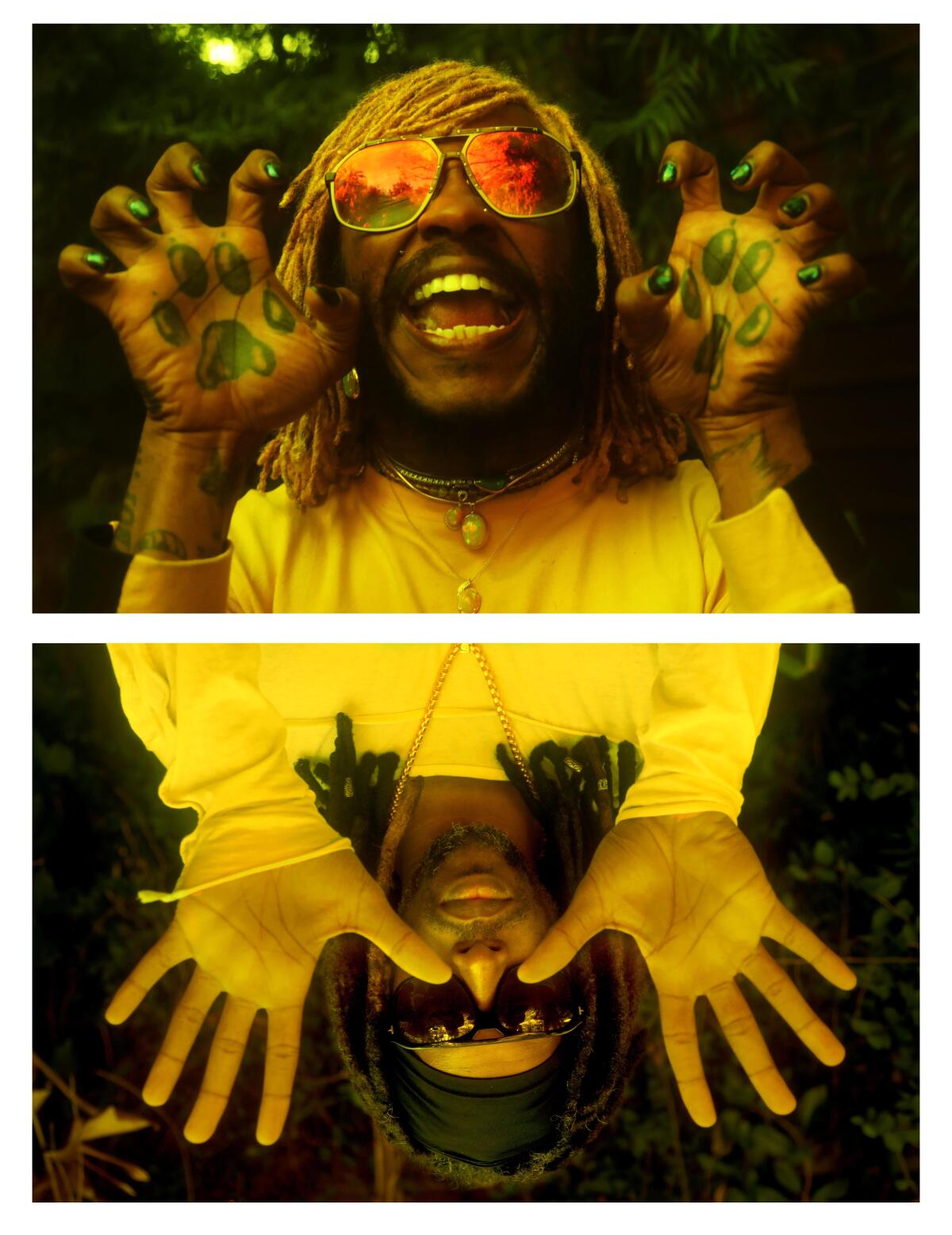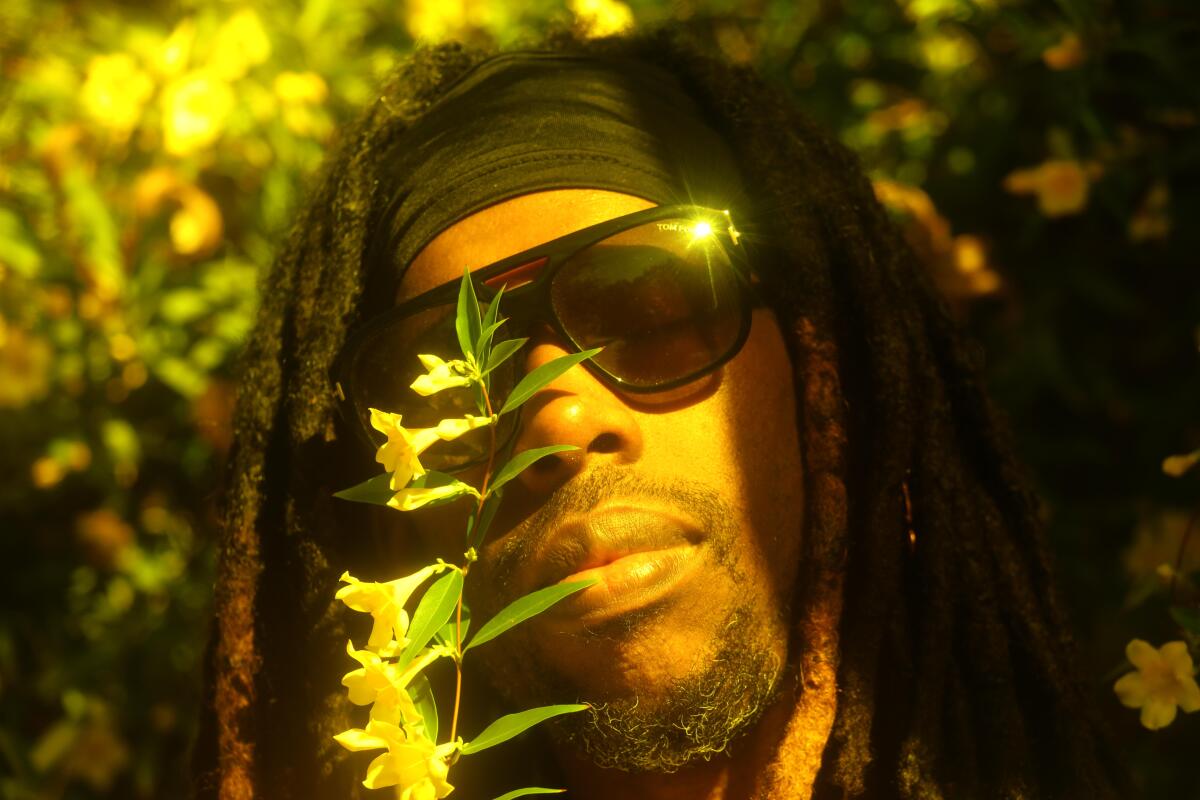This year, L.A.’s most uncompromising pop outsiders have big Grammy hopes

- Share via
Like every artist who released an album in the spring of 2020, the L.A. jazz-fusion bassist Thundercat has had a long time to sit with the mixed emotions of releasing his life’s work at the onset of a pandemic.
“It was a bit hard to process,” he said via Zoom from his recording studio, where he was joined by the disembodied digital voice of his producer pal and longtime collaborator Flying Lotus. “It was like the minute the album came out, everyone said, ‘Get excited, but also stay on the couch and don’t touch anyone. Wear a face condom, but also try to feel some joy.’ ”
“It was weird,” Lotus, born Steven Ellison, agreed. “You never had a victory lap, you didn’t get to tour, you had something that doesn’t feel complete. You didn’t get to ride that usual wave.”
The near-year that’s passed since the 36-year-old Thundercat, born Stephen Bruner, released “It Is What It Is” has been interminable and overwhelming. But it’s also nearing some sort of end.

The 2021 Grammys are, in the scope of things, small consolation, and not top priority for those who lost a loved one to the pandemic, or depended on touring income. But they might end up being something meaningful for two of L.A.’s most acclaimed artists, both long at the forefront of the city’s radically inventive and uncompromising scenes straddling jazz, electronic, hip-hop and experimental music.
Both are up for awards on March 14: Thundercat for progressive R&B album (competing against Chloe x Halle, Jhené Aiko, Robert Glasper and Free Nationals) and the 37-year-old Lotus for producer, nonclassical (against Jack Antonoff, Andrew Watt, Dan Auerbach and Dave Cobb).
“Man, if they don’t give Lotus his Grammy this year, I don’t understand anything,” Thundercat said, laughing.
“When they announced the nominees,” Lotus said, “I was just checking for Cat, to see what they were going to give him.“

Lotus, whose most recent LP was 2019’s “Flamagra,” has never won a Grammy, though he’s been up for dance recording and, as part of Kendrick Lamar’s team, for album of the year. Thundercat received one for his contributions to Lamar’s song “These Walls” but not as a solo act.
The two go back nearly 15 years. They met in Austin, Texas, at the South by Southwest festival when both were emerging acts (Lotus was a staple of the Low End Theory club night at the Airliner in Lincoln Heights; Thundercat played for acts as diverse as Suicidal Tendencies and Erykah Badu). Lotus signed him to his label Brainfeeder and has contributed production to his records ever since.
David Crosby on dinner with Joni, Phoebe Bridgers and the 50th anniversary of his haunted solo debut
David Crosby was grieving his girlfriend’s death when he and friends made ‘If I Could Only Remember My Name.’ Panned in 1971, it’s now a classic.
Even under the best of 2020 circumstances, “It Is What It Is” was going to be an album suffused with grief. Thundercat was a close friend of the late rapper Mac Miller, with whom he collaborated; he was going to open Miller’s headline tour in 2018, and the two were texting excited messages about the upcoming run the night before Miller’s overdose death.
Most of the bassist’s work is buoyed by loony wit — his 2017 LP “Drunk” featured soft-rock icons Kenny Loggins and Michael McDonald. He raised his teenage daughter on progressive jazz records like George Duke, and “It Is What It Is” has elements of both: Hard-sprinting songs including “How Sway” and “Unrequited Love” show a veteran at the height of his powers. His recent edit of the L.A. rock trio Haim’s “3 A.M.” (he and Taylor Swift each reworked a track from Haim’s album “Women in Music Pt. III”) took their tightly wound popcraft in a mystical new direction.
But “It Is What It Is” also reflects the profound unmooring of losing a friend, and how to pursue your craft in the wake of it. “Fair Chance” directly speaks to the loss: “So hard to get over it, I’ve tried to get under it / Stuck in between, it is what it is.”
“A lot of this year was repair from the stuff that happened prior,” said Thundercat, “and it needed to happen. I’ve been kickboxing, going to therapy and learning how to speak more truthfully. Honestly, if I’d gone through all this in the condition I was in a few years ago, I probably would have never gotten the chance.”

He and Lotus, who executive-produced “It Is What It Is,” stayed close throughout both the grieving and the pandemic year. Lotus had a major non-touring project to immerse himself in — the forthcoming Netflix anime “Yasuke,” which he’s executive producing and scoring. The series, with a lead voiced by LaKeith Stanfield and based on a historical figure, follows the first African samurai in medieval Japan.
The tightly guarded series, directed by “The Boondocks’” and “Black Dynamite’s” LeSean Thomas, is set to premiere later this year. Lotus was glad to have it to work on mid-pandemic.
Bunny Wailer, who along with bandmates Bob Marley and Peter Tosh popularized reggae music worldwide with their legendary group the Wailers, died Tuesday.
His 2019 album, “Flamagra,” imagined — documented, really — an L.A. rippling with wildfire, and that perennial sense of doom that comes with living here. The album was eerily prescient. “Man, it had a bonus track called ‘Quarantine.’ I promise I’m going to stop trying to see the future anymore,” Lotus joked.
Both Lotus’ and Thundercat’s music is more rooted in cosmic, psychedelic wandering than current events. But the past year’s constant reminders of the precariousness of Black life in America were a heavy thing for both of them to carry as well.

“People didn’t get to turn away from those images,” Lotus said. “ Even before George Floyd, I felt like I heard about another [police murder] every month. I don’t have any new ways of saying, ‘Stop killing us.’”
“I’m a person who is an escapist creative,” he continued. “ I don’t want to dwell on things that are too real. I don’t like movies about slavery, because I know that story and it’s just going to make me hate people. I want to watch dragons and sorcery and anime; I don’t need any reminders that life is real.”
For both artists, all this time alone has only deepened the importance of their long, long friendship. A Grammy would be a nice coda after a miserable year, but both are pretty hopeful that the worst is behind them.
“This year had been like ‘The Walking Dead,’ where you really see people’s true natures and who is actually still there for you,” Thundercat said. “But the Grammys does feel like a light at end of a tunnel.”
More to Read
The biggest entertainment stories
Get our big stories about Hollywood, film, television, music, arts, culture and more right in your inbox as soon as they publish.
You may occasionally receive promotional content from the Los Angeles Times.













